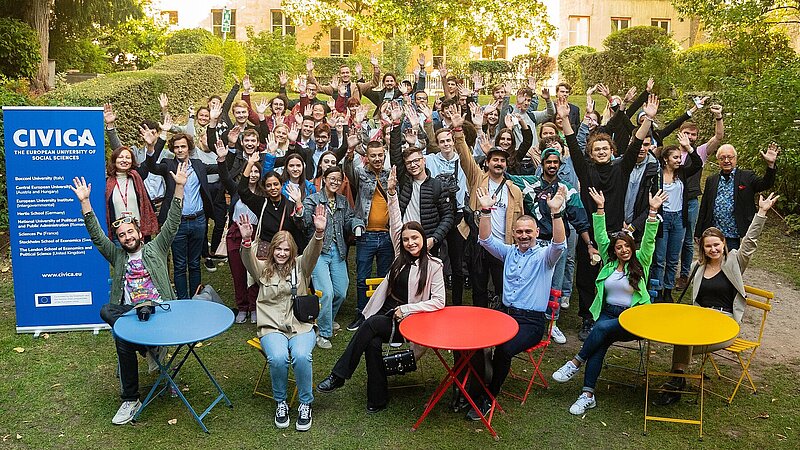
The European university alliance now includes IE University and SGH Warsaw School of Economics.
This month, on the occasion of the Erasmus+ days, the CIVICA alliance of European universities is celebrating its three-year anniversary with the launch of the second phase of funding and the official onboarding of its two new members: IE University (Spain) and SGH Warsaw School of Economics (Poland).
After the successful result of the 2022 Erasmus+ European Universities call for proposals, the ten-member alliance has officially started implementing its joint long-term strategy of building a sustainable European University alliance over the next four years and is ready to prepare for the next funding period with an expanded network, new projects and an ambitious plan for the future.
“Three years full of great achievements for our alliance which offers unprecedented opportunities to our communities,” comments Cornelia Woll, President of the Hertie School, on the alliance’s success in its initial phase of funding. “During the pilot phase, CIVICA members have built a strong basis for a successful collaboration. With the new evolutions ahead, together, we will ensure that CIVICA will become more and more part of students’, faculties’ and staff’s everyday lives.”
Vanessa Scherrer, Vice President for International Affairs at Sciences Po and Coordinator of CIVICA, said: “The ten partner institutions have come together with the ambition to assume civic responsibility for current and future European generations, to strengthen the role of Europe in the world and raise the profile of European social sciences in education and research.”
Two new members on board: IE University and SGH Warsaw School of Economics
With its new members, CIVICA covers a wider geographical and transdisciplinary balance and reflects the diversity of higher education across the continent. IE University and SGH Warsaw School of Economics, respectively from Southern Europe and Central and Eastern Europe, have similar profiles to the existing CIVICA members in terms of expertise, core values and university culture, and bring complementary strengths to the table.
IE University will play a key role in establishing and developing global outreach and partnerships for the alliance. “CIVICA will enhance the work that our ten institutions are doing individually, enabling us to fulfil our mission in a more impactful way,” says Manuel Muñiz, IE University Provost and Dean of IE School of Global and Public Affairs.
SGH Warsaw is among seven Polish universities to join an existing European university alliance. “I am overjoyed that SGH is one of the first Polish universities which engage in creating a Common Area of Higher Education in the European Union,'' shared Prof. Piotr Wachowiak, Rector of SGH Warsaw School of Economics, which is to be responsible for cultivating student community and identity within the alliance. “Together with our partners in CIVICA, we have a very well-prepared plan of actions for the next four years.”
Concrete steps to set the next phase in motion
In the second phase of funding, which has already been successfully reviewed by the European Commission, CIVICA will enrich its academic offer and expand mobility opportunities notably for faculty and postdoctoral researchers, while further developing the European Digital Campus, where links between member university libraries will be strengthened, student projects across the alliance will be supported, and the joint research environment will be reinforced through calls for research proposals.
After announcing its renewed mission statement, the alliance will foster advancements in education, research and innovation and service to society. These four pillars of CIVICA are interdependent and provide a solid foundation for a sustainable, transnational and research-intensive European university network in the social sciences and humanities.
About CIVICA
CIVICA brings together ten leading European higher education institutions in the social sciences, humanities, business management and public policy, with a total of 72,000 students and 13,000 faculty members. Together, they build on an ever-stronger combination of teaching, research and innovation to mobilise and share knowledge as a public good and to facilitate civic responsibility in Europe and beyond. CIVICA’s members are:
- Bocconi University (Italy)
- Central European University (Austria and Hungary)
- European University Institute (Intergovernmental)
- Hertie School (Germany)
- IE University (Spain) – ie.edu
- National University of Political Studies and Public Administration (Romania)
- Sciences Po (France)
- SGH Warsaw School of Economics (Poland)
- Stockholm School of Economics (Sweden)
- The London School of Economics and Political Science (United Kingdom)
The Hertie School is not responsible for any content linked or referred to from these pages. Views expressed by the author/interviewee may not necessarily reflect the views and values of the Hertie School.
CIVICA contact
-
Alessia Manco, Manager Communications, CIVICA
